Posts by Jesse Liu
7 Benefits of Working with China Manufacturers You Must Know
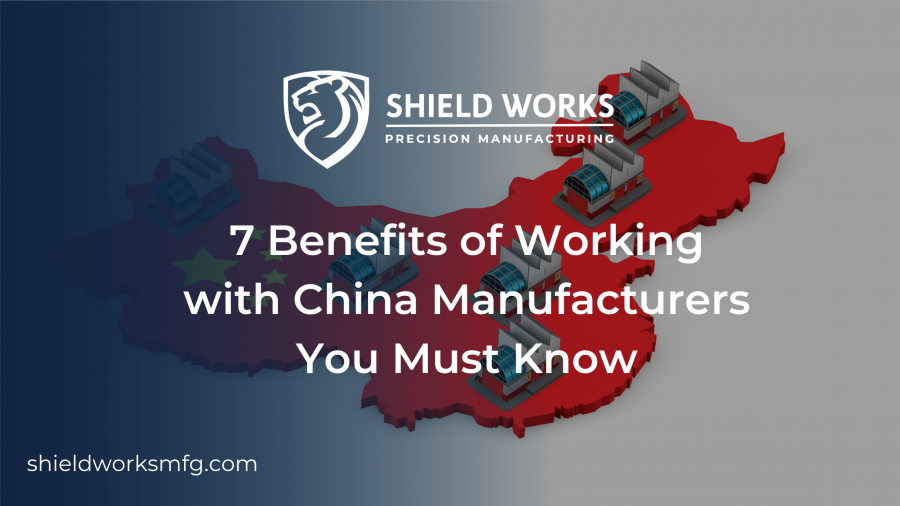
Deciding whether to outsource your manufacturing to China can be an overwhelming process, but there are many reasons to choose China as your manufacturing hub. Here are five of the most important benefits you should consider before making a decision.
Lower Costs Than Western Counterparts
One of the primary benefits of outsourcing your manufacturing to China is the lower labor costs.
Besides having fewer overhead costs, Chinese facilities also have lower training costs. In order to cover these costs, domestic manufacturing facilities must set aside a significant amount of money.
Businesses of all types outsource instead, as wages in China are also lower than in the United States.
When you outsource, you can spend less per dollar, so you can reap the benefits that can come from using Chinese product assembly. Keep this in mind when you are considering moving forward.
Larger Production Volume
A business does not necessarily need to manufacture thousands of products in one order. However, in some cases, large organizations often have a hard time locating a domestic facility that can meet their bigger-than-normal needs.
This means that China has typically built facilities that are able to produce large volumes of goods for many different countries. Even an average Chinese factory can outperform the vast majority of western facilities.
When it comes to companies that require a massive supply of their product, there is no better alternative than outsourcing to China. In many cases, it is also the only way to meet your goals.
Diversified Production
To long-term success, scaling your business may be needed.
This can happen in a variety of ways. For example, you might add a new product line to generate additional revenue.
One option would be to find growth opportunities in one of China’s developing markets. That way, you can use them to establish a niche in your business. Designing new products is one of the key ways in which they help.
Choosing a Chinese OEM plant, in some cases, might give you an edge over your competition.
Flexibility of Product Design
Domestic facilities usually cannot adjust their design at your behest because it could take them days or weeks to actually put them into practice.
You may have to change the way you do business to sell a more desirable product if you don’t have high enough sales numbers. Adding to this, delayed orders because of design changes also carry the risk of your customers turning to competitors.
It is our understanding that Chinese manufacturers are ready to implement any changes required of them. As for you, all you need to do is contact the representatives from your company and describe the alterations that you need.
The manufacturer will typically make revised products as soon as possible after you inform them of your change, which is an important consideration as it will affect your brand’s reputation.
IP Protection
Many people are unaware that many Chinese factories prioritize intellectual property protection.
This means they make sure you don’t end up in legal trouble by avoiding any form of infringement. To illustrate, suppose you sell a product that is extremely similar to that of your competitor.
As with any other manufacturing industry, there are shady facilities that engage in such tactics. A reputable factory in China will make sure that there is no copying or reverse engineering going on.
It is good news that you can research the reputation of your prospective factory before choosing to work with them. Otherwise, you may find yourself in a situation that is difficult to remedy.
Efficiency
China’s factories are capable of mass production, and it is a simple matter for them to do so with remarkable speed.
These new and efficient facilities can meet any production standard. This will allow smaller organizations to compete with larger ones.
Many small businesses can’t keep up with the production rates of large corporations. Without the help of the right manufacturers, these businesses will never be competitive.
Tips of Finding The Factory Right for You?
It can be difficult to find a reliable Chinese manufacturer for all sorts of reasons, like time zone challenges and language barriers. With the help of a professional, you will be able to get a firm grasp on which factory is best for your company.
You’ll find that they are a go-between who has contacts at the other party’s end. That way, they’ll be able to work out the finer points and make agreements without you even needing to intervene.
You can take a look at this resource to find out how you can use this to your advantage.
We Are You Go-To Option
With the above information in mind, you can be sure that you are deciding the right course of action for your company.
From here, you’ll be able to employ Chinese manufacturing for appropriate businesses. Want to learn more about Shield Works with 17 years of China manufacturing experience? Please get in touch with us today and see how we can help.
The Risks of Outsourced Manufacturing: What You Need to Know
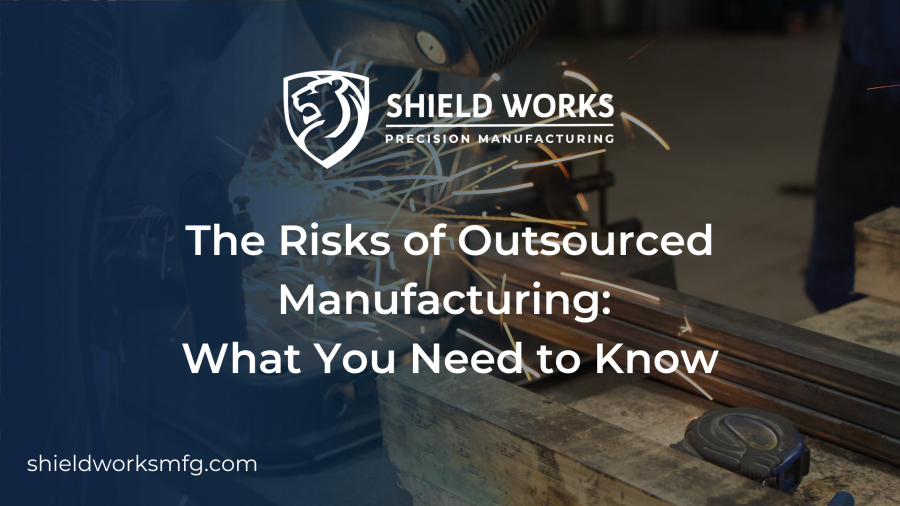
When you outsource your manufacturing, you’re trusting someone else to handle the job of turning your idea into a tangible product. While this usually works out well and can bring significant cost savings to your company, there are risks involved with outsourcing that you should keep in mind as you consider outsourcing as an option for your business or organization. Read on to learn about some of the most common risks of outsourcing manufacturing and how to avoid them so that you can maximize your benefits and minimize your costs.
Supplier Risk
Direct arrangements with suppliers from any industry come with risks. However, the risk is greater when buying from an international supplier. Prior to outsourcing, you must conduct a thorough investigation.
Then, you need to conduct a thorough risk assessment using the possible markets and suppliers. Identify any potential issues with the provider’s possible suppliers.
It must include the supplier’s operations, quality, leadership, and labor. Check to see if their track record lives up to their promises.
By doing so, you will avoid disruptions caused by your supplier failing to follow through. You can also ask other helpful businesses who have used your potential supplier. As soon as you make your decision, you’ll gain insight into working with them.
Quality Assurance
The lead time, as a result, for transporting products is longer compared to domestic sources, if product failure occurs from an international source, which can cost you suffer severe business disruptions.
If the problems get severe, it can take months to resolve them. To mitigate this risk, you need to prepare detailed product specifications for your sources. You’ll periodically perform independent quality control inspections.
You may lose your reputation if your product quality declines. Avoid this by observing the manufacturing process for a few weeks. It is cheaper and ensures quality, so it’s better than having to recall a product.
Intellectual Property Protection
Don’t share sensitive information with your outsourced manufacturers until you check their origin country and their intellectual property rights. Otherwise, your proprietary information might be leaked.
In cases like this, IP laws are more relaxed in the manufacturer’s country. Depending on the product, you may find it better not to outsource anything. If your product undergoes regular updates, however, this might not be an issue.
You might overlook patent protection if you think you can produce better items faster and with better quality. This can happen when you pump out new products faster than the market can handle.
Transportation and Delivery
Outsourcing to a foreign service is tricky if you don’t take it one step at a time. If you do it poorly, the delivery will be delayed.
A common timeline for ordering and receiving your product should be important to your outsourced manufacturer. Think about whether they can meet a timeline for production. In case the total is greater than it has been, you must work to make the customer’s expectations fit reality.
One may also look for a workaround to restore the time to its correct place. Otherwise, you may accidentally erase all your work. Given the importance of this issue to customers, we’ll need to keep it at the forefront of our priorities.
Sourcing Labor
This type of conversation doesn’t happen as often, but when it does, it can hurt your brand. Make and fulfill your products with a manufacturer that follows humane standards.
It is especially important when it comes to labor laws and other relevant guidelines for employee safety that your manufacturer’s guidelines match your own country’s. It is your responsibility as well as your outsourced help to adhere to ILO guidelines if your country is a member.
Weather
Despite how it might seem, what your manufacturer does in relation to the weather can affect how it’s perceived. A rough bout of weather can lead to various delays. Doing so puts your brand in a negative spotlight because it has to be revealed what your labour force looks like.
How well your supply chain holds up to weather-related crises can affect your reputation, as well. Though they’re flawed, it’s not always best to steer clear of your brand name. As a result, you must put it before anything else.
Should You Outsource Manufacturing?
If your company is not ready for outsourcing, you should weigh the benefits of this decision. A number of benefits are available to you.
You will cut your spending as well as boost the productivity of your business by doing so. Popular demands are produced by many companies.
Additionally, you’ll avoid every aspect of manufacturing bureaucracy. It’s what slows businesses down, especially in countries with strict regulations.
Invest in Outsourced Manufacturing Today
While there are risks involved, partnering with an outsourcing manufacturing company can be helpful in boosting your business productivity. The first step is to find a reputable manufacturer. Use this advice to find the best provider.
Have you been considering manufacturing internationally? If so, please get in touch with Shield Works and we’ll talk about how our 17 years of outsourced manufacturing can help your business thrive!
How to Work Successfully with a Product Development Company in China
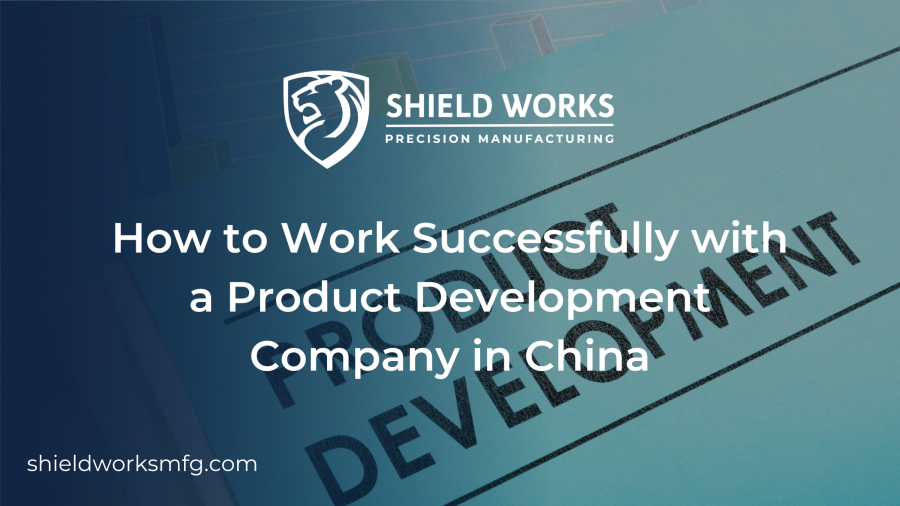
Whether you’re outsourcing manufacturing or just having product development done, working with a product development company in China may be the best thing you can do for your company. It’s not always easy to work with these companies and get what you want, but by following these tips, you can make sure you have the best experience possible when working with a product development company in China.
Researching if a Chinese company is right for you
Do your research to make sure the company is reputable and has a good track record. Request referrals from other clients, read reviews, and look for third-party verification on their website or social media pages.
If you’re still not sure, contact your potential manufacturer directly via email or phone to ask them questions about their manufacturing process, products they’ve made before, turnaround time, etc. Make sure you’re clear on what you want upfront so there are no surprises later. Make sure you have a clear idea of how much it will cost and how long it will take to get the product manufactured once all details have been finalized.
Finding the right supplier
There are many things to consider when looking for a supplier, such as cost, quality, turnaround time, and communication. Quality is always the most important consideration but you will have to weigh that against your budget and desired timeline. For example, if you’re going for high-quality but don’t want it delivered quickly, you’ll need to find someone who specializes in producing slow-moving items or can give you a discount on the price.
A product development company with a widespread network of suppliers in China can help you a lot as they provide a vast pool of options for you. This can save you time and money, as you’re likely to find several good suppliers from one firm.
Use an Online Translation Tool
If you’re looking to develop a product with a company based in China, it’s important to establish clear communication from the start. Using an online translation tool can help bridge the language barrier and ensure that both parties are on the same page. You should find a reliable translation software provider such as Google Translate or ICanLocalize before your project starts.
Always be sure to get in touch with your partner before starting work on your project. Communication is key to everything, and make sure you language is simple to understand. Do not assume that the partners will understand what 5×5 means when used in reference to size, or finish by Labor Day, as the Chinese Labor Day falls on May 1, when referencing deadlines. Be specific when discussing measurements and timelines so there is no confusion.
Use Templates as a Starting Point
When you are ready to start working with a product development company in China, it is important to have a clear idea of what you want your product to be. Templates can be a great starting point for this process. However, be sure to communicate your vision clearly to the company you are working with.
It may also be helpful to do some research about popular products on the market and create images or sketches based on these ideas. For example, if you want a toy that will help teach toddlers how to count and learn colors, you could use pictures of other toys that teach those skills as a template.
Ask For Samples
Always ask for samples of their previous work. This will give you an idea of their quality and craftsmanship. If possible, try to have someone visit their facilities, given the current travel restrictions, and meet with their team in person. This will help you get a better sense of who you’ll be working with and how they operate.
It’s important to find the right balance between trusting your instincts and choosing the company that checks all your boxes when it comes to your budget, timing, quality standards and expertise.
Document Everything
When working with a product development company in China, be sure to document everything. This includes contracts, communication, and any other important details. If god forbid, when it comes time for you to file a complaint or lawsuit against the manufacturer, you will have everything on hand for the process.
It is also important to remember that often times there are discrepancies between what was agreed upon and what was actually delivered. It is best to document as much as possible so that you can catch these discrepancies early before they escalate into an issue.
Deal With Design Changes at Scale
Changes are common in a design process. They may be minor, such as changing the color or size. Or they can be major, such as changing materials or components and all that entails. However, it is important to note that there are two types of changes: those that can easily be made at scale and those that cannot. The latter must always be done by hand.
When working with a product development company in China, make sure you specify which type of change you want done so the designer will know what to do! If your project requires many changes, have your Chinese manufacturer provide guidance on how to handle them.
Working with a product development company in China is not something to take lightly, but the rewards can be great if you do your research. That takes an experienced product development company for you to achieve, and Shield Works is one with 17 years of experience in this area. Reach out to us if you’d like to know more!
5 Reasons Why Making Your Product Prototype in China Is A Good Choice
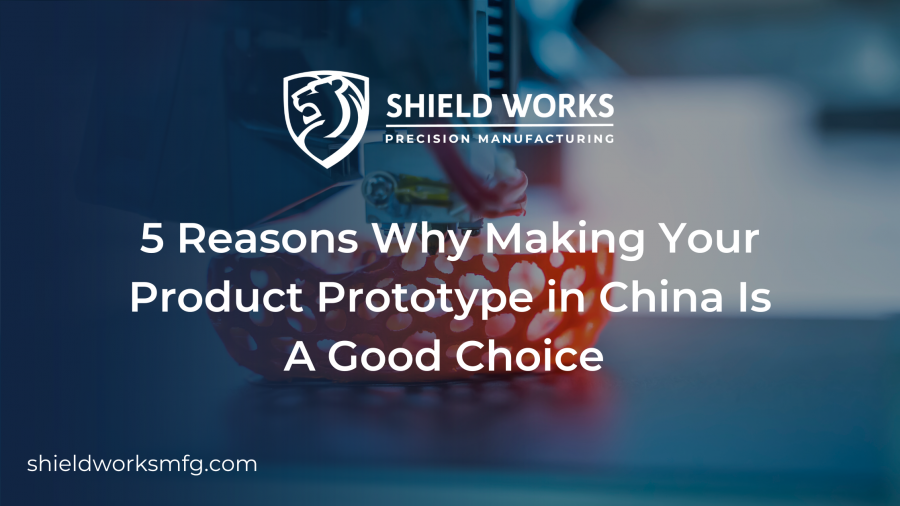
Are you looking to make your product prototype in China? If so, your decision might be the right one, but there are several factors that must be taken into consideration beforehand, such as cost and the amount of time needed to complete the project. Let’s take a look at 5 reasons why making your product prototype in China may be your best choice.
Advanced Technology
China has been increasingly investing in advanced technology, making it a go-to destination for product prototyping. With state-of-the-art facilities and experienced engineers, China can create high-quality prototypes quickly and efficiently. If you need to make changes to your prototype, all you have to do is send the design files over the internet and let them know what changes you want made. Advanced technology means that more complex products like robotic arms or 3D printers are readily available as well.
They also have a huge variety of materials including metals, plastics, ceramics, textiles and wood, which means you can be experimental in the process. For example, if you wanted a metal tumbler but one was not readily available on Alibaba’s website, they could use stainless steel sheets to create one for you.
Prototyping speed
There are a few reasons for this. The vast majority of Chinese manufacturers are extremely efficient and organized. They can usually turn around a prototype much faster than their Western counterparts.
Second, the cost of labor is much lower in China, so the cost of making last minute change will be lower and more feasible as well. Chinese manufacturers are often more flexible and willing to make changes to the prototype than Western manufacturers.
There is also a wide range of manufacturing capabilities in China, so you’re likely to find a supplier that can meet your specific needs. Meanwhile, many Chinese manufacturers have experience working with Western companies, so they’re accustomed to meeting Western standards.
Cost Saving
When it comes to cost savings, making your product prototype in China is a no-brainer. Chinese manufacturers are able to produce high-quality prototypes at a fraction of the cost of their Western counterparts. As we mentioned above, the low cost of labor in China means that you can get your prototype made for a fraction of what it would cost to have it made in the West.
The low cost of labor also means that there’s no need to worry about sourcing locally and incurring additional expenses by having everything shipped over. Plus, if you’re working with a larger company and require different types of prototyping services like 3D printing or metal casting, as they likely already have all these materials on hand, that can also save you even more!
International and Industrial Experience
If you’re looking for an experienced and reliable manufacturing partner to help bring your product to life, China is a great option. You’ll benefit from China’s vast pool of international and industrial experience, as the country is home to some of the world’s most advanced manufacturing facilities and technologies. The vast majority of Chinese manufacturers are ISO 9001 certified, so you can be confident in their quality control processes.
You’ll also find that China has factories that specialize in producing various components for both domestic and export markets, which will allow you to save on costs by using only one factory. Even if your company is small or medium-sized, it will have no problem finding a manufacturer with the capacity to produce your order.
Most factories have relationships with overseas buyers who they work with regularly; this means they can give you priority service even if they are busy with other clients at the time. In fact, many factories have English speaking staff members who will work closely with you throughout production process.
Faster Delivery
For many startups and small businesses, the biggest advantage of working with a Chinese manufacturer is not only the speed at which they can get product prototype made, but also delivered. This can ensure more flexibility in reviewing and making more spontaenous changes.
Many Chinese manufacturers use logistics and shipping companies to ensure quick deliveries, with a wide selection of ports or even airports to ship, wherever your prototype is made. Their logistical networks are very expansive and spreads all around the world, so no matter you are located, your prototype can always manage to arrive in time!
All of these aforementioned factors make China an attractive option for entrepreneurs who are looking to create a new product prototype. If you want your company to take off, and you’re considering which country would be the best fit for your new project, it’s worth investing some time into learning more about China’s cost-effective benefits. All it takes is a reliable and experienced manufacturing company, such as Shield Works. We have over 17 years of experience of prototyping and international team that ensures smooth communication. Reach out to us if you’d like to know more!
4 Things You Must Know about IP Protection in China If You’re Manufacturing There
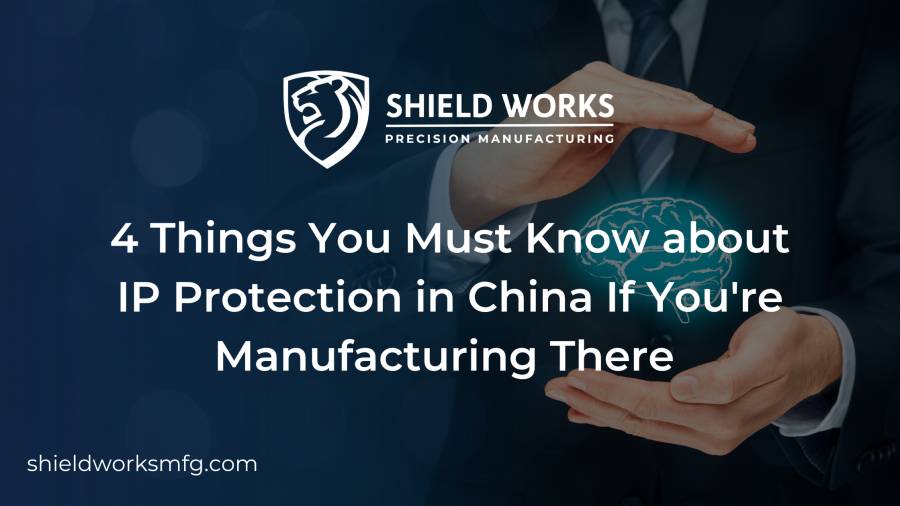
China manufacturing has become much more popular in recent years, with the China being known as the ‘world’s factory’. However, while China manufacturing offers many benefits, it also comes with its own unique set of challenges, including intellectual property protection issues. For those considering manufacturing in China, here are four things you must know about IP protection in China if you’re manufacturing there to help you avoid potential legal issues down the road.
It’s Different When You Are Not From There
In any country, protecting your intellectual property (IPR) is difficult. It becomes even more complicated when you are dealing with a foreign jurisdiction like China, which has its own set of laws and customs that differ from your own. While no one wants to consider they might ever need to use IP protection methods, they can be an asset if you are faced with problems.
Before you seek legal help or pursue someone for violating your IP rights, remember that many IP cases fail because companies make basic mistakes; before taking action, it pays to know some of them. For example: Remember that you are a foreigner – Chinese laws should protect you against infringement, but don’t assume they will.
Having a backup plan is important because there is always a possibility that law enforcement may not assist you. Keep in mind who owns what – In China, registered trademarks are owned by the registrant rather than being assigned based on where products are sold. Due to this rule, you could lose ownership over your trademark simply by failing to register it properly. In addition to using multiple locations for manufacturing facilities and offices, Chinese businesses tend to utilize multiple forms of IP protection, such as patents, trademarks, and copyrights.
Trademark Registration in China
In order to fully protect your intellectual property (IP) rights, you must apply for trademark protection in China. There are three ways to do so: chinese national or regional trademark offices can be contacted directly, through a representative, an agent, or through a representative of an agent.
Direct registration is cheapest and fastest. If you don’t speak Chinese fluently, you will likely want to use an agent rather than trying to do this on your own. The best agents have years of experience filing trademarks in China and can walk you through the process.
Make sure your trademark is maintained by filing periodic renewal applications before its expiration. If you fail to renew, you risk losing all legal protections conferred by registration-including the right to prevent others from registering a similar mark. It is called trademark squatting when someone registers a trademark similar to yours after yours has expired. This process occurs frequently and is called trademark squatting.
Generally, copyright protection is achieved through registration with CIPA (China Intellectual Property Office). This ensures your work is protected legally.
Following completion of examination and approval procedures, trademarks can be registered with SAIC (State Administration for Industry & Commerce) or SIPO (State Intellectual Property Office). In addition to providing exclusive rights for your trademark, it also allows you to contest its use in court if necessary. If you wish to register a trademark, the most important thing is to make sure it hasn’t been registered by another party first; otherwise, you may face difficulties if you want to register it at a later date.
Brand Protection
When it comes to your creations, if you haven’t registered them through patent or copyright registration with qualified departments, you cannot take advantage of their legal protection. For instance, when developing something new, ensure it is registered intellectual property before distributing it to others for commercialization. This will allow you to lay the groundwork for future protection of your rights and interests.
Make sure you include an effective copyright notice on all of your original works. Copyright is defined as a form of personal ownership that protects original works of authorship including literary, architectural and artistic works from being used by others without permission or compensation.
What To Do with An IPR Dispute
You should definitely keep your records – things like your business contracts, licenses, registrations, licenses, licenses, you name it. You don’t want to destroy any records!
Check with a local attorney before signing agreements like these because they often have clauses that should be looked at beforehand. The clauses listed in this section may jeopardize Intellectual Property Rights in China.
When a dispute does arise, you can find a way to solve it by going to the police or foreign courts, among other choices. They are many instances, like going before the entire commission of Beijing Arbitration and seeking help from other departments such as SIPO and the National Copyright Administration.
Alternately, many foreign companies can solve their problems by going to the local technology offices for consultation at any time. One solution you may turn to after you consult with an infringer and find that it refuses to respond to the consultation is to take the infringer to court by yourself or to apply for help from SIPO. The most important thing is to be prepared with IPR protection before bringing the infringement to an end in China.
It’s better to prepare for the worst-case scenario, like if you found a company with a safe production facility and its own IP protection zone. Shield Works is just such a company. Different types of IP protection services are available, such as a partnership with a leading IP industry expert in China. If you want more information, you can always get in touch with us!
Can We Trust 3rd-Party Quality Control Services in China?
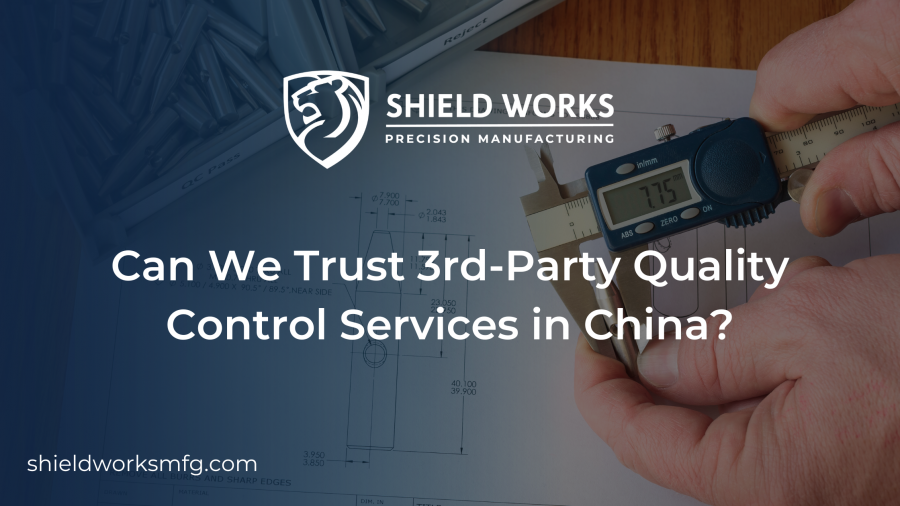
When you’re considering outsourcing your manufacturing to China, you may want to consider having an 3rd-party quality control (QC) agency check and test your products before they are shipped out of the country. But product quality Chinese suppliers provide can really vary sometimes. In order to combat this, manufacturers hire 3rd-party quality control services to inspect their product before they are shipped. But can we really trust them?
The importance of quality control in Chinese manufacturing
Generally speaking, quality control is essential for any manufacturing process, but it is especially important in China. If a company is not careful with its QA practices and starts producing poor-quality products, then the costs will skyrocket and profitability will fall dramatically.
For example, if a company produces one thousand defective units of product per day to be sold at $6 a piece and the cost to produce each unit was $2 then the total profit would be $4 per day ($4k per year). However, if 10% of the units are defective then the total profit would drop to $0 ($0k per year) because even though there are 1000 units produced they cannot all be sold at full price because some are defective. In other words, the more defects you have on your products, the lower your revenue will be.
That’s why it’s so important to have a good quality control system in place before production begins so that you don’t have these problems down the line. You are there for less headache but more cost-efficacy, not the other way around. Quality control is also important because consumers want assurance that the products they buy will work as advertised.
Doubt about Chinese 3rd-party quality control service providers
The quality of products made in China used to be questioned a lot. Companies often experienced difficulties with ensuring product quality and it was difficult for them to have peace of mind when they started manufacturing their products in China. It was not until the emergence of third-party inspection services that companies had some relief from this problem, but many companies still have doubts about whether or not these service providers are really independent.
It is because Chinese 3rd-party quality control service providers do not always act independently, and instead may act as agents for certain suppliers who are more powerful than others. Their goal is not only to improve product quality, but also the reputation of those suppliers who pay them well.
Can I trust them now?
The past can’t be denied. But thankfully, with the boom of advanced manufacturing in China and higher standard of quality required, 3rd-party quality control service there has become much more truly “independent”. They are equipped with a variety of professional skills for inspection and testing.
The most important thing is that these service providers are not dependent on individual factories but rather they offer their services to multiple factories as well as other buyers or clients.
You will also find that they often use various inspection methods to analyze products, including high-tech equipment such as X-ray machines, which are typically only available at highly specialized labs in the United States. All this means it’s easier than ever before for foreign buyers to purchase goods from reputable suppliers who employ such a service provider.
As for their job scope, these professionals will conduct inspections on all aspects of the product: shape and form, weight, color and appearance, size, packaging labels etc. If anything looks off (whether it’s an incorrect measurement), then your order might get rejected.
Moreover, because each factory may specialize in different types of items (such as electronics or food), hiring a QC service provider provides some assurance that any factory producing your product type is running according to modern standards. As long as you have faith in your own evaluation process and checklists from home office or another reputable company within your industry while visiting potential suppliers in person too—you’ll have nothing to worry about!
So yes, you can trust the 3rd-party QC providers now, just as how big names like Apple and Panasonic do!
How to choose an appropriate QC provider
It can be difficult to determine whether or not a 3rd-party quality control (QC) service provider in China is trustworthy. Here are a few tips to help you choose a reputable QC provider:
1. Do your research. Make sure to read online reviews and check out the company’s website about who they currently work with or have ever worked with, before making a decision.
2. Consider your needs. What type of products do you need to have inspected? What is your budget? Once you know what you’re looking for, you can start narrowing down your options.
3. Get in touch with the QC provider. Ask questions about their services and see if they would be a good fit for your business.
4. Request quotes from multiple providers and compare. The cost of a 3rd-party QC service is generally going to vary depending on your needs. For example, a full inspection for new products may cost more than a spot check for recently-produced goods. Some companies will even have an annual or semi-annual discount package that you can opt into. Once you have quotes from different providers, compare their prices and see if there are any special deals being offered by one company that you can take advantage of.
With the current travel restrictions, since they can’t be physically there to inspect, 3rd-party QC service in China has gradually become a popular option for many businesses with outsourced manufacturing there, which many of them have later found a pleasant surprise.
Shield Works is one with 17 years in this area as well as its own professional QC team and partnerships with certified labs. Contact us if you’d like to know more about our QC service!
5 Reasons Why Manufacturers in China Can Help You Gain Your Customers’ Trust
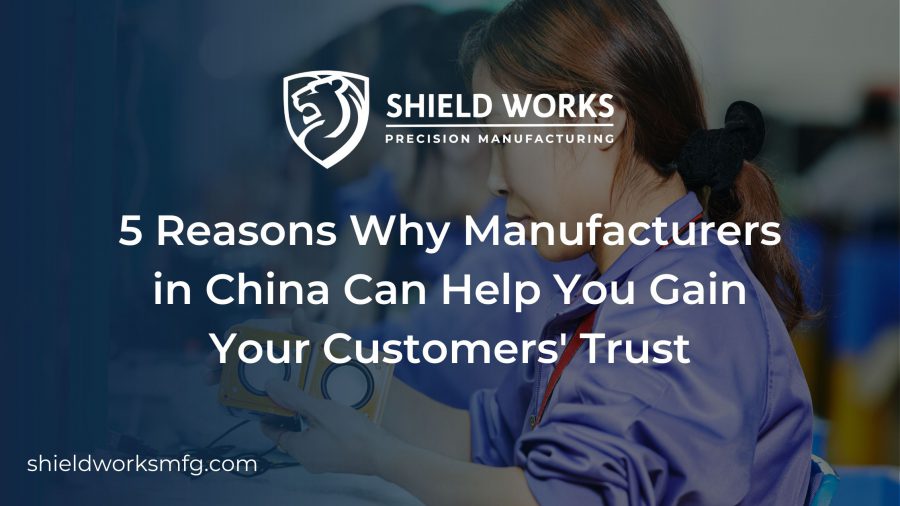
Your customers are cautious when it comes to trusting your brand with their hard-earned money, especially if you’re new on the market. But offering them high-quality products that solve their problems and make their lives easier goes a long way toward building their trust in you and your brand. If you’re having trouble manufacturing products that meet this high standard, consider manufacturing them in China, where companies like ours can offer you extensive expertise in product development and production. Here are five reasons why doing so will help you earn your customers’ trust.
1) Manufacturing as a service
When you outsource your product development to a contract manufacturer in China, you’re getting more than just a manufacturing partner. You’re also getting access to a wealth of knowledge and experience that can help you create a product that meets and exceeds your customers’ expectations.
A good contract manufacturer will have a team of experienced engineers who can offer valuable insights into the design and manufacture of your product. They’ll also be up-to-date on the latest manufacturing technologies and trends, which can help you create a cutting-edge product.
Additionally, most contract manufacturers in China have established relationships with suppliers, which can give you access to high-quality components at competitive prices.
2) Always-on customer service
In today’s world, customers expect 24/7 access to customer service, no matter where they are or what time it is. By partnering with a manufacturer in China that offers always-on customer service, you can be sure that your customers will always be able to reach someone when they need help. This can help build trust and loyalty, both of which are essential for any business.
Also, manufacturers in China provide your customers with high quality products, which reduces the chance of filing a complaint to customer service to begin with. When manufacturers are focused on producing only high-quality products, the product development process becomes more streamlined and efficient because there’s less risk of defective products making it to the marketplace.
3) Transparency and flexibility
When it comes to manufacturing, Chinese manufacturers are known for their transparency and flexibility. This means that you can be sure that your products are being made to the highest standards possible, and you get to monitor the whole process.
Many of the production facilities in China are well equipped with a surveillance system that offers you access to the process anytime of the day. If anything goes wrong, you won’t need to worry about being shielded out. Your factory is just one Skype call away! Some of these factories also offer an on-site consulting service where they’ll give advice on how to increase efficiency and quality at your plant.
Another perk? They will often offer training courses at their facility so that employees at your company can learn new skills while they’re there.
4) Customization and Personalization
In today’s market, customers are looking for a personalized experience. They want products that are tailored to their specific needs and preferences. By working with manufacturers in China, you can create products that are truly unique to your brand. This will help you stand out from the competition and make a mark in consumers’ impression.
If your competitors are using generic items that have been sourced through a third-party company, they’re not going to be able to offer this kind of customization. Manufacturing in China allows you to cater specifically to these wants and desires so it gives you an edge over the competition.
It’s important to note that, with a Chinese manufacturer, you don’t have to invest heavily into personalization from day one. Start small and build your way up so you can expand as necessary. If a company is able to add some flare or customize a product without it affecting their bottom line, they will be more willing to do so over time. Just knowing you’re listening closely to consumer demands gives customers confidence that you’re paying attention and want them back for future purchases.
5) Testing before shipping
Any good manufacturer will test products before shipping to ensure they meet both the quality standards of the company and the customer’s expectations. In addition, manufacturers in China have a reputation for being able to quickly adapt to new designs and requirements, which can be extremely helpful when your product is still in development.
Furthermore, many Chinese manufacturers offer very competitive prices without compromising on quality, which can help you save on costs. Finally, by working with a Chinese manufacturer, you can be sure that your products will be made with the latest technology and equipment available.
If you insist in inspection all the way through, it’s very common in China to hire a 3rd-party inspection for quality control. There are some experienced inspectors who are well-known and trustworthy. Once production is completed, the factory may ask the inspector to come in and do final inspection according to your requirement such as checking if there are any broken parts or other defects. After approval from the inspector, they ship out goods immediately.
Earning trust is a lasting process. With a reputable Chinese manufacturer, you will rest assured every step of the way. Shield Works is one with a great reputation for its 17 years of experience with global retailers. Contact us for more!
Qualities to Look for in a China 3rd-Party Quality Control Service Provider
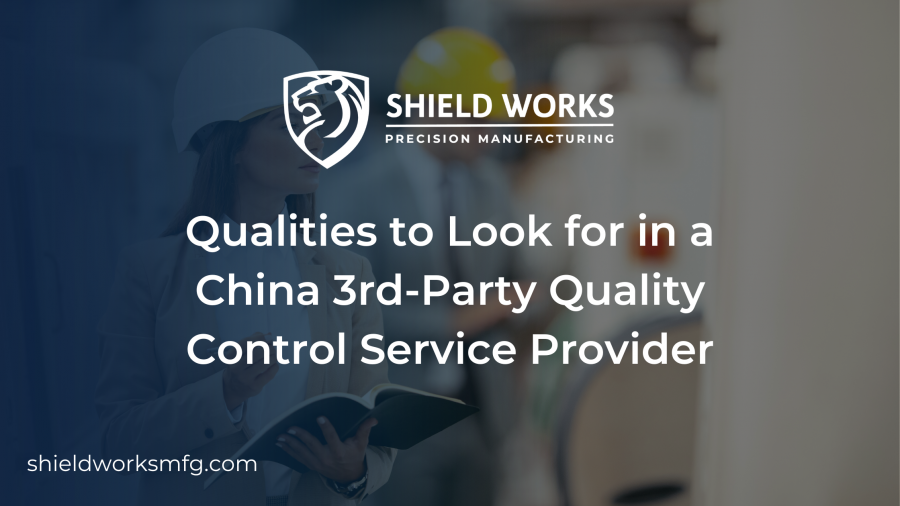
When you’re manufacturing in China, it’s essential to have 3rd-party quality control to ensure that your products are up to your standards. But which companies should you be choosing from? The answer can be found in these three qualities of the best China 3rd-party quality control service providers out there.
Prompt Communication
One of the most important qualities you should look for when choosing a quality control service provider is prompt communication. This means that they should be responsive to your inquiries and requests in a timely manner. They should also keep you updated on the status of your order and any changes that may occur. A reliable China 3rd-party quality control service provider will not leave you hanging or waiting for updates about your orders, as this could result in delays.
When picking out a potential quality control service provider, make sure they are open and honest with you during their initial communications. If they do not answer all of your questions thoroughly, it might be best to find someone else who can.
Dedicated Staff
One of the most important qualities to look for when choosing a quality control service provider is whether or not they have a dedicated staff. This team should be knowledgeable about quality control procedures and able to handle all aspects of the process from start to finish. They should also be available promptly enough to answer any questions or concerns you may have.
Another important factor to consider is whether or not the quality control service provider has an in-country office. This is important because it allows them to be on the ground in China, which gives them a better understanding of the local culture. It also means that they are more likely to have connections with suppliers and factories since they’re in close proximity.
If this doesn’t sound like something your current supplier offers, then you might want to switch providers.
A Wide Range of Products
You should look for a quality control service provider that has experience with a wide range of products. This way, you can be sure that they will be able to handle whatever product you need them to inspect. They should also have a good understanding of the manufacturing process and know how to spot potential problems.
If they are not well versed in your industry, it could take them much longer to find any issues. For this reason, it is important to find a quality control service provider who specializes in your industry as well as inspection type.
Good Prices
You want to be sure that you’re getting a good price for the services provided. A quality control service provider should be able to offer you competitive prices that are in line with the market. It’s important to do your research before deciding on any company. Ask other businesses who they use and compare prices before making your decision.
You also want to make sure that you get a fair deal when it comes to pricing. A high price tag doesn’t always mean better quality, so don’t be afraid to ask about how the rates were determined. In some cases, you might even find out that there are hidden fees or expensive fees after looking at the total amount of money you’ll have to pay at the end of a project. Another thing is if they charge by hour or by job, because this will affect how much time it takes them to complete their work and also what they’ll charge per unit of work completed.
Innovative Solutions
You should look for a quality control service provider that is innovative and always looking for new ways to improve their services. They should also be able to provide you with customized solutions that fit your specific needs. A good quality control service provider will do whatever it takes to make sure that the products they are inspecting meet or exceed your standards. They are able to work around any problems, such as issues with how the product was manufactured, or even communication barriers if necessary.
They also have to be well trained in inspection techniques so that they can find any defects before the goods are sent off. Some of these may include chemical tests, sensory evaluations, and destructive physical inspections.
Does Not Need Face Time
One of the most important qualities to look for when choosing a quality control service provider is that they don’t need face time. This is important because it means that they’re able to work independently and don’t need constant supervision. They should also be able to communicate effectively and have a good understanding of Chinese suppliers. A company with these qualities will be better equipped to handle the needs of your company than one who requires hands-on direction, which may not always be possible or even necessary.
There are many things to consider when choosing a quality control service provider in China. Make sure to do your research and ask around before making a decision. To sum it up, the most important qualities to look for are experience, flexibility, customer service, consistency and professionalism. With so many providers to choose from, you should be able to find one that meets all of your needs. Shield Works is one with 17 years of professional experience as well as its own quality control team, which guarantee you worry-free inspection service all the way through. Reach out if interested!
A Step-by-Step Guide to the Product Development Process
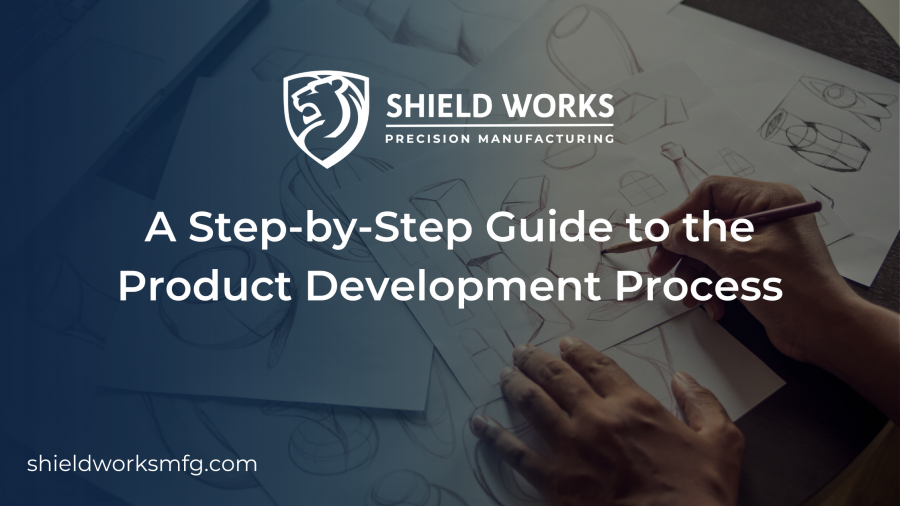
According to studies, 56% of business owners believe their product manager’s skills have room for improvement.
In today’s world, it seems like there’s a new product on the market every day. Whether you own a start-up or work for a tech giant, developing and releasing your product can be an exciting – but also daunting – process.
At its core, the product development process is comprised of several stages that companies go through from beginning to end. While not all products will undergo every stage (for example, some skip the initial research phase), each stage is equally important to produce quality, innovative products that will keep consumers coming back for more.
Let’s take a closer look at each step of the product development process:
What Is Product Development?
Before we can dive into the various stages of product development, it’s important to have a clear understanding of what this process entails.
Product development is the process companies use to create new products. This usually starts with a lot of research and testing, as well as careful planning. Many different departments or teams within a company work together to make this happen.
The Stages of Product Development
While all product development processes will differ slightly from one another, there are generally considered to be seven core stages that most successful products go through. Let’s go through them now:
1. Ideation and Conceptualization
The first stage of product development is when companies think of new products. This can be done by researching the market, observing customer behavior, or brainstorming with a team.
Once an idea has been generated, it’s time to start fleshing it out into a more concrete concept.
2. Market Research
After settling on a concept, the next step is to conduct market research to determine whether or not there is a demand for the product. This includes analyzing the competition, understanding customer needs and wants, and developing buyer personas. All of this information will be used to help fine-tune the product concept.
3. Business Plan Development
Once the market research phase is complete and it’s been determined that there is indeed a demand for the product, the next step is to develop a business plan. This will include setting objectives, outlining strategies, and estimating costs. The goal at this stage is to create a roadmap that will guide the product development process moving forward.
4. Prototype Development
Once the business plan is complete, the next step is to create a prototype of the product. This could involve designing and building a physical prototype (such as creating computer models, 3D-printed designs, or using clay to build a mockup), or it could be in the form of software code if working on an app or digital product.
The purpose of this stage is to test out different design ideas and iterate until a final design has been settled upon.
5. Crowdfunding
Depending on the type of product being developed, it may be necessary to seek funding from investors or launch a crowdfunding campaign to raise funds for production. Crowdfunding platforms such as Kickstarter and Indiegogo have become increasingly popular in recent years as they allow companies to gather early support for their products.
6. Design and Production
Once a design has been finalized, the next step is to produce the product. This can involve working with manufacturers and suppliers, as well as creating packaging materials and marketing collateral. Additionally, organizations may need to seek patents or trademarks for their products at this stage to protect them from potential infringement.
7. Marketing and Distribution
The final stage of China product development is marketing and distribution. This is when companies start promoting their products to generate awareness and interest, as well as making them available for purchase through various channels.
Additionally, some organizations may choose to provide support or warranty services for their products at this stage.
Now that we’ve gone through each stage of product development in China, let’s take a look at how long it generally takes for products to go from concept to launch.
How Long Does It Take to Develop a New Product?
There is no one-size-fits-all answer to this question. This is because the amount of time it takes to develop a new product will vary depending on factors such as the type of product being developed, the number of people involved in the process, and the overall complexity of the product.
That said, we can offer some general guidelines based on our experience working with companies in a wide range of industries. For example, ideation and conceptualization typically take 1-3 months depending on factors such as how many ideas are being explored at once and how large the team is.
Similarly, market research can take anywhere from 2-6 months to complete depending on factors such as how much information you need to gather and how long it takes to analyze that data.
Once you have collected all of this information, it’s time to start building out a business plan. This usually takes 3-6 months for most organizations, although it can be shorter or longer depending on the complexity of the product and the availability of resources.
After the business plan is complete, it’s time to start developing a prototype. This can vary widely in terms of time and effort, but it typically takes 2-4 months to create a working prototype.
Finally, once the prototype has been created, it’s time to start seeking funding and preparing for production. The amount of time this takes will again depend on factors such as the type of product being developed and how much money is needed to get started.
For example, launching a crowdfunding campaign can take anywhere from 1-3 months, while seeking venture capital can take 6-12 months or longer.
Need Help With Your Product Development Process?
The product development process can be long and arduous, but it’s worth it in the end. By taking the time to go through each step, you can ensure that your product is high quality and meets customer needs.
If you need help along the way, our team of experts at Shield Works are here to assist you. We have years of experience helping businesses develop products that sell. What stage of product development are you currently in?
Check out our services page for more information on how we can help you bring your product to market.
Protecting Your Intellectual Property: What Your Chinese Manufacturer Can Do

Your intellectual property, your product design and the manufacturing process you’ve created are often what sets you apart from the competition. That’s why you want to ensure that your intellectual property rights are protected and that nobody can steal your idea and market it as their own. The best way to do this is to partner with a Chinese manufacturer who understands the importance of intellectual property protection, and who knows how to protect it even when they manufacture your product in China.
Work with an experienced IP lawyer
Before you decide to work with a Chinese manufacturer, it’s important to know if the company has solid partnership with any professional and experienced IP legal service. They can help you understand the risks involved and develop a strategy for protecting your IP. Here are seven ways your lawyer can help:
1. Review your contracts.
2. Train your employees on IP best practices.
3. Develop an IP management plan.
4. Register your copyrights and trademarks in China.
5. Monitor the market for infringements.
6. Take action against infringers
For example, Shield Works has long-term partnership with a local law firm specializing in IP laws, Innopat. Innopat is a professional patent and trademark agency authorized by the National Intellectual Property Administration of the People’s Republic of China. Since 2002, Innopat has been dedicated to the specialized practice of intellectual property law including patent, trademark and copyright law.
Register your intellectual property in China
Before you can take any legal action against an infringer, you need to ensure your intellectual property is registered in China. The first step is to file a trademark application with the China Trademark Office. If you have a patent, you’ll need to file a patent application with the China National Intellectual Property Administration. Once your intellectual property is registered, you can begin taking steps to defend your rights in court should there be any infringement. There are two options for registering IP in China.
As we mentioned above, you can either work with a lawyer to register it yourself or hire a company that specializes in this process (known as IP service providers). That can save a lot of headache.
Consider patent filing overseas
Filing for a patent is a costly and complicated process, but it’s often worth it to protect your intellectual property. If you’re manufacturing products in China, you should consider filing for a patent in China as well as in other countries where you plan to sell your products. Your Chinese manufacturer can help you with the paperwork and logistics of filing for a patent overseas. They can also help you monitor your product to make sure that no one is infringing on your intellectual property. By working with your Chinese manufacturer, you can help protect your invention and ensure that you get the credit (and profits) you deserve.
Companies with a western background, such as Shield Works, compared with local Chinese companies, have more experience in this regard, as they know better about the western legal system.
Make sure contracts are signed
The legal protection in China is weaker than that of the US, which means someone could copy your product and sell it before you ever receive permission from the US Patent Office.
You need to ensure that all future developments are owned by the factory and not just those covered by patents. The factory can make an exclusive license agreement with its employees who create these new inventions.
The contract should require employees to assign all their intellectual property rights in any invention they create during their employment to the company for a set time period (usually 10 years). It is also important that everyone involved understands what types of inventions are covered by this agreement, for example new formulations of products and processes for manufacturing goods.
Know When To Transfer Technology
When working with a Chinese manufacturer, it’s important to know when to transfer technology. If you’re working on a new product or process, you’ll want to keep the intellectual property (IP) in-house. But once the product is finalized and ready for mass production, it’s time to transfer the technology to your manufacturer. This will help protect your IP and prevent knock-offs. Here are a few things to keep in mind when deciding when to transfer technology:
1. The product should be finalized and ready for mass production.
2. You’ll want to keep the intellectual property in-house until this point.
3. Once the product is ready for mass production, it’s time to transfer the technology to your manufacturer.
There’s no need to stress how important it is to be aware of the risks of intellectual property theft and take steps to protect your products and designs, when working with a Chinese manufacturer. By taking these precautions aforementioned, you can help ensure that your intellectual property is safe from theft. Shield Works is a manufacturer that does everything it takes to protect customers’ IP and ensures a infringement-free manufacturing process in China with our exclusive security system. Interested in knowing more? Don’t hesitate to contact us!
